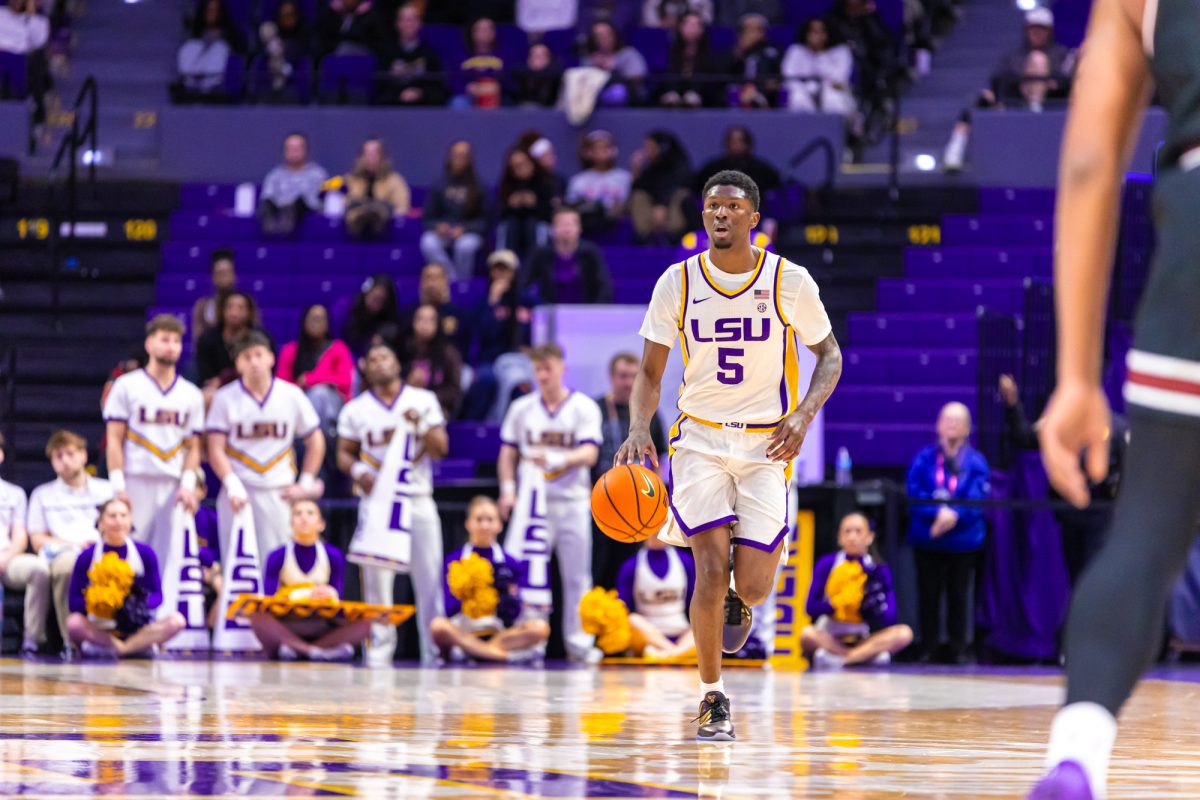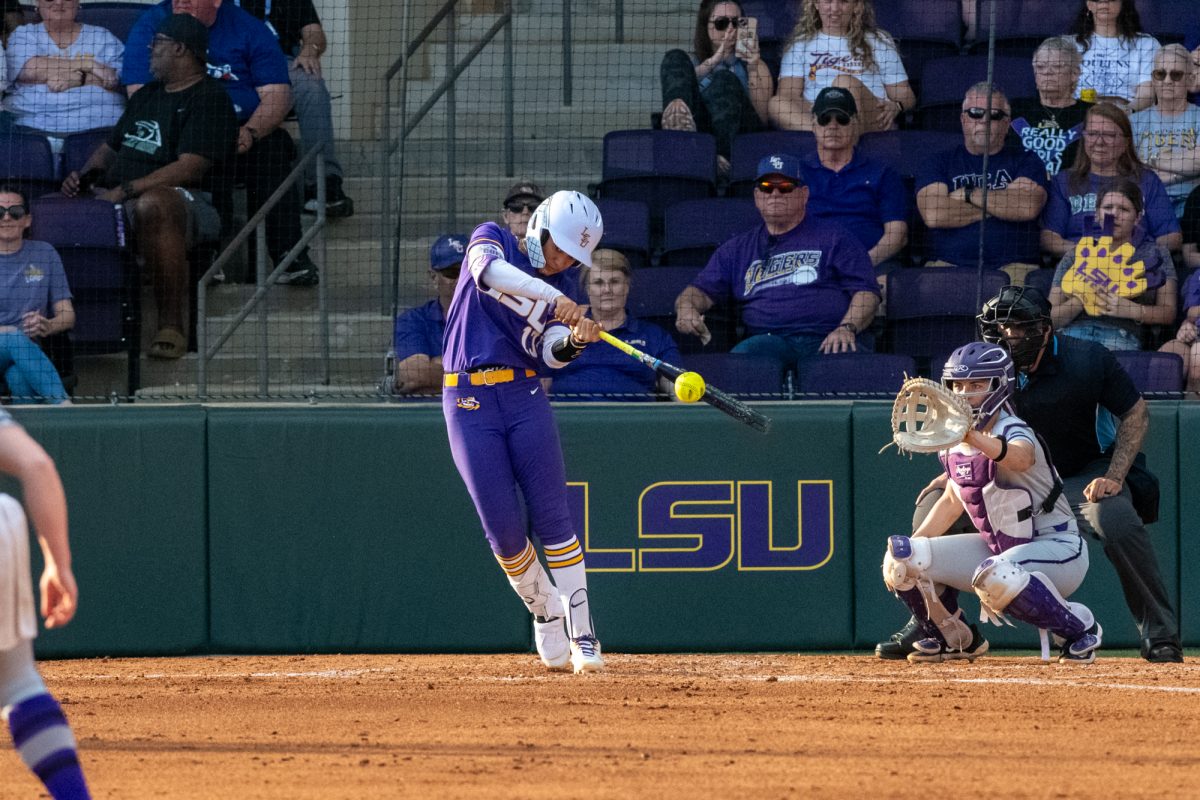LSU’s stay in the National Invitation Tournament was over almost as soon as it began.
On Sunday, LSU was announced as a four-seed in the NIT and given the privilege of hosting a first round game.
On Tuesday, the Tigers were bounced from the NIT with a 84-77 loss to North Texas, concluding LSU’s NIT run and its season.
“I’m really proud of what our players have been able to accomplish,” head coach Matt McMahon said. “It was a challenging season in a lot of ways.”
LSU made the NIT after finishing as one of the Southeastern Conference top-two non-NCAA tournament teams in the NET rankings, earning them an automatic bid as per the NIT’s new selection rules. The Tigers also benefitted from numerous NIT opt-outs from major teams, such as Ole Miss, but they were nonetheless excited for the opportunity.
The NIT was supposed to be a fitting end to a turnaround season that went from a disappointing non-conference performance to an exciting 9-9 record in SEC play highlighted by wins over South Carolina and Kentucky, who are both now in the NCAA Tournament.
Perhaps one of the most important points of that turnaround was a 66-62 win over North Texas in November, which gave the team life after discouraging losses to Dayton and Nicholls State.
In the second matchup between the two teams, though, North Texas, the defending NIT champion, was firmly in command throughout, despite a furious late run from LSU (one of many this season) that cut the lead from 18 to five.
During the run, which was first sparked by Jordan Wright’s back-to-back contested 3-pointers, LSU employed full-court pressure, forced turnovers and then cashed them in on the other end.
Wright scored 25 points to lead both teams in his final collegiate game. His efforts were important as LSU tried to close the gap, with 14 of those points coming in the final eight minutes.
That aggression came too late, though, and LSU officially finished its season with a 17-16 record.
The NIT was described by McMahon before the game as an opportunity for the team to both get postseason experience for its younger players and send its seniors out on a high note.
Despite the short stay in the NIT, there were certainly learning opportunities to be had, especially when it comes to responding to physicality.
“We play in the most physical league in the world,” McMahon said. “That’ll be part of our offseason development, continue to get bigger, stronger.”
With the loss, LSU has seen the last game for Wright, Will Baker, Trae Hannibal and Hunter Dean in purple and gold.
“For the guys coming back, they know what it takes now,” Wright said of the seniors’ impacts. “They know what it looks like to win… I hope that’s the thing we left with the young guys.”
McMahon and the program now look ahead to the future, where LSU will continue to build to where it can compete in high-intensity games such as this one.
In this first postseason challenge of the McMahon era, LSU wasn’t ready. The hope for the program is that, with time, it will be – even as the lights get brighter and the Tigers find themselves on bigger stages like the NCAA Tournament.
North Texas played its preferred style and stayed in control
North Texas is a team that plays with a slow, deliberate pace. According to KenPom, its adjusted tempo is No. 360 in the nation – that’s out of 362 Division I teams.
In the early going, the flow of the game seemed to favor North Texas’ style. Most of the game was contained to the half court, where the Mean Green’s physicality shone through.
Even when North Texas got out in transition, though, which it was able to do often at the end of the first half, the Mean Green seemed like the more comfortable team. They were in control throughout.
LSU struggled to find daylight offensively, as it seemed that there was always a North Texas player attached to the ball handler’s hip or in their chest. LSU couldn’t get going and generate quality looks in the paint, even with a significant size advantage.
“They were just more physical,” Hannibal said. “We want to dominate, you know, physicality, rebounds… they did that.”
North Texas has been a team that prides itself in its defense all season, ranking No. 40 in opposing field goal percentage. The team is physical and aggressive, and that’s a big part of why it’s 18-14 on the season.
That showed in other areas as well, where North Texas’ effort helped it come up with loose balls and rebounds. They outworked LSU all throughout the game, in all phases.
Ultimately, LSU’s offense shriveled for most of the game in the face of that physicality and pressure, and it was too much to come back from in the end.
READ MORE: PHOTOS: LSU men’s basketball falls to North Texas 84-77 in the PMAC
Speed advantage and a blitz from 3-point range swung the game in North Texas’ favor.
From the beginning of the match, the game went as the 3-point line went, LSU opening up a lead because of its success from deep. In the early going, LSU had run out to a 17-11 lead off a few made threes, brief openings in North Texas’ stifling defense.
That didn’t last for long. From the middle of the first half on, North Texas kept finding openings from 3-point land and kept a steady lead.
North Texas’ 3-point success came as a result of its excellent guard play, as it has all season. As a team, the Mean Green shoot the 14th-best percentage from 3-point range in the nation.
Against LSU, North Texas seemed to have a speed advantage. The Mean Green don’t have a rotation player taller than 6-feet-9-inches. In the first matchup between the two teams, LSU took advantage of that, but this time, that edge was unnoticeable.
North Texas’ greater speed as the smaller team seemed to stick out when the Mean Green kept finding openings, especially from beyond the arc, as LSU’s bigger defenders were caught chasing.
LSU was feeling all of the drawbacks of going big and reaping none of the benefits. Back in November, LSU got bigs Will Baker and Derek Fountain going for 30 combined points and piled up 36 points in the paint.
“I thought we did a lot better job with our physicality around the rim,” North Texas head coach Ross Hodge said. “That was the emphasis coming in.”
This time, LSU had trouble getting good looks in the restricted area, and North Texas put up 11 3-pointers on a 47.6% percentage.
North Texas had an offensive identity it stuck to, while LSU struggled to find consistency.










